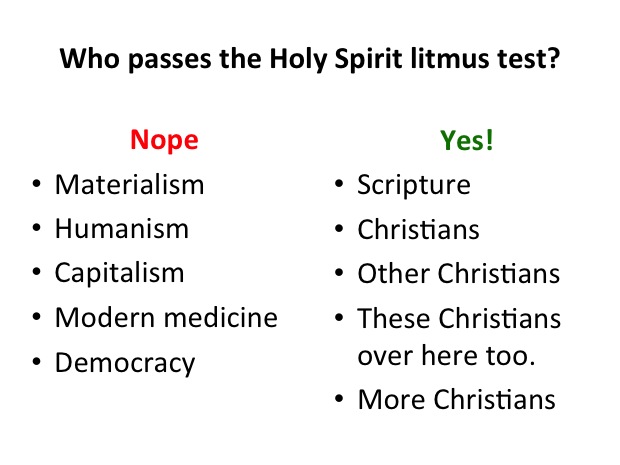This is the text of the sermon I gave on January 26th, 2014. The theme is Christian unity and diversity, and the rather low bar of proper Christology. I try to give lots of practical examples. I’ve divided it into just two posts. As ecumenicism is something close to my heart and often on my mind, I was able to ad-lib quite a bit of this. The bulk of it is still here, though in a more stilted form and with less editing than usual. Some personal references have been scrubbed.
The scripture for today:
1 Cor 12:1-11
Now concerning spiritual gifts, brethren, I do not want you to be ignorant: You know that you were pagans, carried away to these dumb idols, however you were led. Therefore I make known to you that no one speaking by the Spirit of God calls Jesus accursed, and no one can say that Jesus is Lord except by the Holy Spirit.There are diversities of gifts, but the same Spirit. There are differences of ministries, but the same Lord. And there are diversities of activities, but it is the same God who works all in all. But the manifestation of the Spirit is given to each one for the profit of all: for to one is given the word of wisdom through the Spirit, to another the word of knowledge through the same Spirit, to another faith by the same Spirit, to another gifts of healings by the same Spirit, to another the working of miracles, to another prophecy, to another discerning of spirits, to another different kinds of tongues, to another the interpretation of tongues. But one and the same Spirit works all these things, distributing to each one individually as He wills.
Let us pray:
Lord Christ, thank you for giving us your Word for instruction. As Paul says in the scripture passage for today, “I do not want you to be ignorant.” God, I pray that you would use this little half-hour that someone gets up and talks at church each week to keep us a little less ignorant as well. But we know that none of these words mean much at all unless your Holy Spirit takes them today and works impossible things in our hearts. We ask you to send your Holy Spirit to do just that today, as you have in the past and we know you will continue to do throughout our lives. Even more than for your Word, we thank you for your love which, though we long to understand it, we don’t need to understand it to receive it, since you love us like a parent loves their little children. Jesus Christ, I ask that we would know your love today. Amen.
The Litmus Test
Alright, there are two things in the passage I’d like to talk about today. In verse three, Paul gives us a litmus test of sorts to determine whether a person or their ideas are of the Spirit of God or not. Some of you may remember using a litmus test in chemistry class, where you use a little strip of paper coated in a special reactive dye to measure the acidity of a substance. A few people around here still use them today for their jobs too. Here though I’m using the phrase “litmus test” figuratively to mean, as the dictionary says, “Any test which produces a decisive result by measuring a single indicator.” How do you know that something is of the spirit of God? Well, sometimes it’s tricky, but one really good guideline is what Paul says here.
No one speaking by the Spirit of God calls Jesus accursed, and no one can say that Jesus is Lord except by the Holy Spirit.
Alright, so you hear anyone trash-talking Jesus? Not of God. Plain and simple. Can’t shut up about how great Jesus is? Well, even if they’re confused about some other things, that’s a really good place to start and they shouldn’t be written off so quickly.
The apostle John gives us a similar test in his first letter. This is from 1st John 4:2-3.
This is how you can recognize the Spirit of God: Every spirit that acknowledges that Jesus Christ has come in the flesh is from God, but every spirit that does not acknowledge Jesus is not from God.
So something may seem to be a good idea or seem to work or to make sense, but if it does not acknowledge Jesus Christ it’s not really of the Spirit of God and one should proceed with caution in handling it. And as John is a little more specific about it, acknowledging the IDEA of Jesus or saying something nice about him is not good enough. You have to acknowledge that Jesus Christ, this real person that actually walked around in Israel back about 2000 years ago, was actually God, creator of the whole universe, in the flesh. That’s a tough pill to swallow for a lot of folks, but it is the one thing that really makes us Christians or not. Do you believe Jesus was the GOD-MAN? If so, then congratulations! You are some kind of Christ-person, a Christian. If the answer is “eh, not really”, then guess what? Whatever else you might say, you aren’t a Christian by anyone’s definition, you are something else.
Seemingly good things that do not acknowledge Jesus as Lord.
We have to be careful with any seemingly good thing that doesn’t acknowledge Jesus as Lord. Free-market capitalism has done wonders to make the Western world rich and prosperous and dramatically reduce poverty and basic suffering. But it is not beholden to Christ but rather to the almighty dollar. The shareholder is in charge and private property is the chief virtue. These can be good things, but they are rooted in a hard-working humanity that perpetually pulls itself up by its bootstraps, not a God that comes to save a ruined people.
Modern medicine can do amazing things, saving us from deadly diseases and accidents through skillful surgery and miracle drugs. Many doctors practice out of a genuine desire to serve people made in God’s image. But it is not an end in itself and it cannot save us from death. To anyone whose been stuck in the hospital long-term or had to buy health insurance themselves lately knows there is a dark and oppressive side to this whole art and science. When personal choice, privacy, safety, and fulfillment are the governing principals rather than the Lordship of Jesus Christ, then the work itself will become sick.
Democracy too is not the least bit holy. Democracy says, you have a right to have things your way if you can get enough people to agree with you. Man is the center. You can’t really have an election to decide if Jesus Christ is really of God. He might get voted out of office next year. Jesus asks that we be like him, giving up our lives.
“We hold these truths to be self-evident: that all men are created equal; that they are endowed by their Creator with certain unalienable rights; that among these are life, liberty, and the pursuit of happiness.”
When is this from? 1776? It’s from the Declaration of Independence. I think some people think this is a Christian or biblical idea here. It’s not really though. This was written by Thomas Jefferson – a clever man to be sure, but someone who thought Jesus totally not important. Jefferson was a deist. That is, he believed in a distant, abstract Creator, but not a loving God who came to rescue us. In this system, who is the savior? It’s us. We save ourselves through our hard work and pursuit of happiness. We don’t need a Messiah – it’s our right to have that covered already.
Now I don’t mean to knock these things too much. Let’s have free markets and good medicine and democratic governments that resist corruption. But let’s have these markets and clinics and capitols populated by a people who love Jesus and who are willing to serve him even at great personal cost.
So these things DON’T necessarily confess Jesus Christ as Lord. We can’t count on the Holy Spirit always working through them. So what can we count on? The church! Yes, it’s kind of a mess, but we Christians are who the Holy Spirit is always working on and through. We DO pass Paul’s test here – we do declare Jesus is Lord. We even get together and sing songs about it every week.
So why do Paul and the other apostles and Christians throughout history have to encourage us so often towards unity? It isn’t because we argue about Jesus being God or not – that’s actually settled. We are so much alike. That leaves smaller things to quibble about. You know how fiercely brothers can fight with each other? It’s because they are typically so alike. You are actually much less likely to get in a fight with a stranger. Throughout history, the bloodiest wars are often civil wars. We Christians do that too unfortunately. The more alike we are, the more likely we are to forget the big things we hold in common and argue about smaller details.
There are lots of divisive issues in the church today here in America. If you live in Africa or Asia, the issues are different, but we are most familiar with the ones right here. It’s one of the main reasons we have so many church denominations. What are some things Christians have really liked to argue about here in the last century or so?
Music! What music you should play in church of course! Should we all sing together, or leave that mostly to professionals? Should we only sing or are instruments ok? What about contemporary instruments like electric guitars? How about drums? Should we sing old songs or new songs? Should we sing lots and lots of songs, or just a few so we can spend most of our time listening to bible reading or teaching. Should we sing really rich theological songs that will make very educated people happy or simple songs for people that can barely read? Should they be loud to show our enthusiasm or quite to show our reverence? Good questions. But no matter how you slice it, what are nearly all the songs about? Is it Jesus being God and coming to save us? Christians!
Church ecclesiastical structure? Who’s in charge? Should it be Pope in Rome or someone closer to home? Should it be a regional group of leaders (a presbytery) or just a few elders from a local congregation? Maybe just one guy is really in charge in each gathering. Maybe it should be a democracy and we should vote about everything. Maybe having designated leaders is too subject to abuse so we should have super small decentralized churches that meet in peoples homes. Oh, and with all these different ways of running things, is Jesus still the God-Man, our only savior? Yes? OK. Great!
What’s another thing Christians argue about? How about something a little deeper and more important. How about the nuts and bolts – the mechanics, of how people actually get saved? Some people would call this the Calvinism versus Arminianism debate though I think both of those old guys, if alive today, would probably be a little upset to have their names thrown around and attached a pretty wide variety of ideas they may or may not have had anything to do with. But this is an important question, and different theologians and pastors and churches have come down in different places in how they explain from the Bible exactly how salvation works. Are you saved when you say a particular kind of prayer confessing your sins? Are you saved when you are baptized? Are you saved from before you were even born, from the foundation of the world? Can you get unsaved if you do some bad stuff and your not sorry enough about it? Can you stop Jesus from saving you if you really don’t like him? Are you really saved if you love God but your life is still kind of a mess. (Gosh, I hope so!) But who, what one person does ALL the saving, because he is God himself in the flesh? That’s right Jesus, Jesus, Jesus across the board.
A sampling of different Christian gatherings





The world doesn’t hate us because of our music or our institutions or even our theology. It’s Jesus they can’t stand. He’s the great stumbling block. There is no way around him. His historical death and resurrection throws a monkey wrench in everything and you either have to embrace it or run away. As Christians, we are learning to embrace Him, all of us, though we go about it in varied ways.

